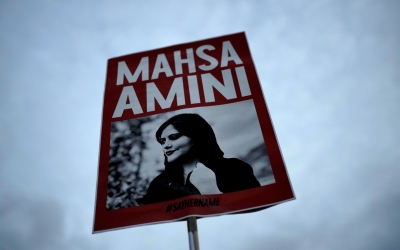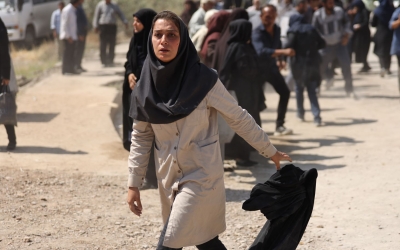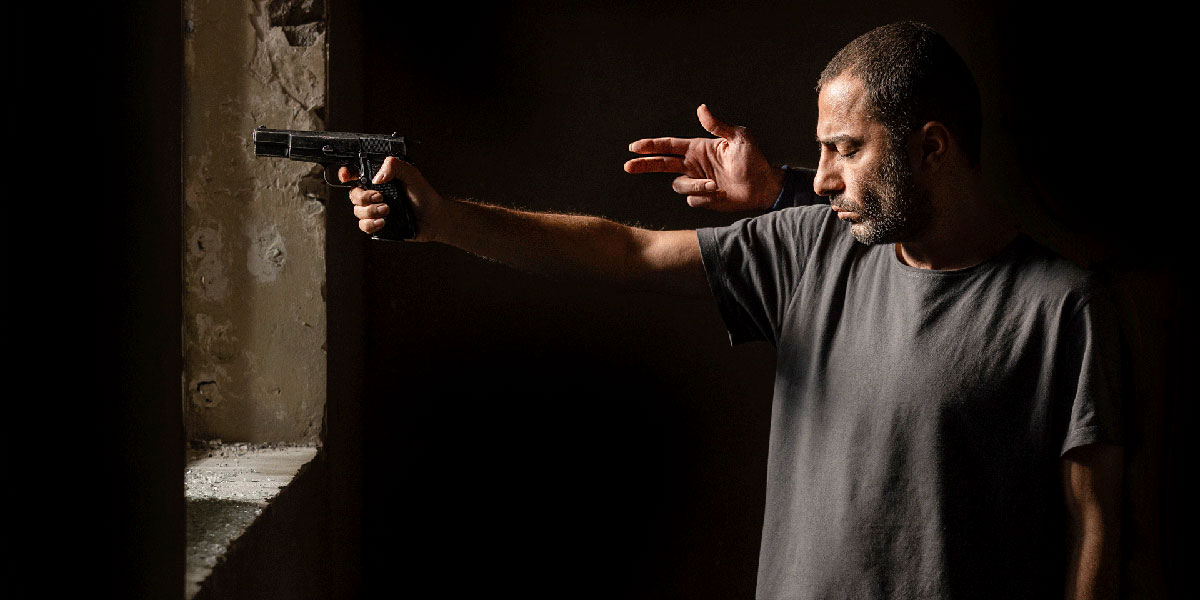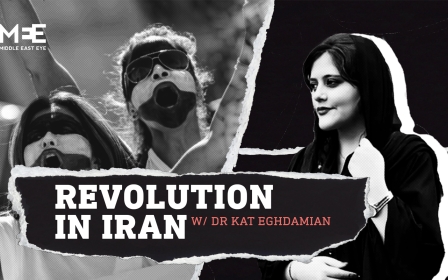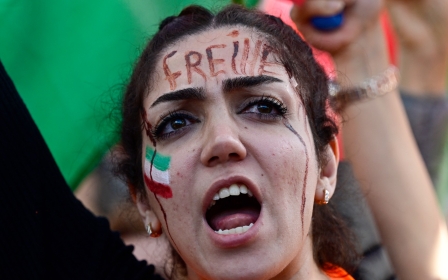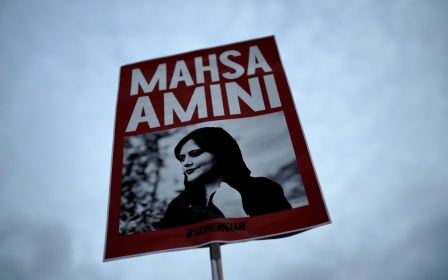Iranian cinema at crossroads as artists reject authorities' rules on hijab
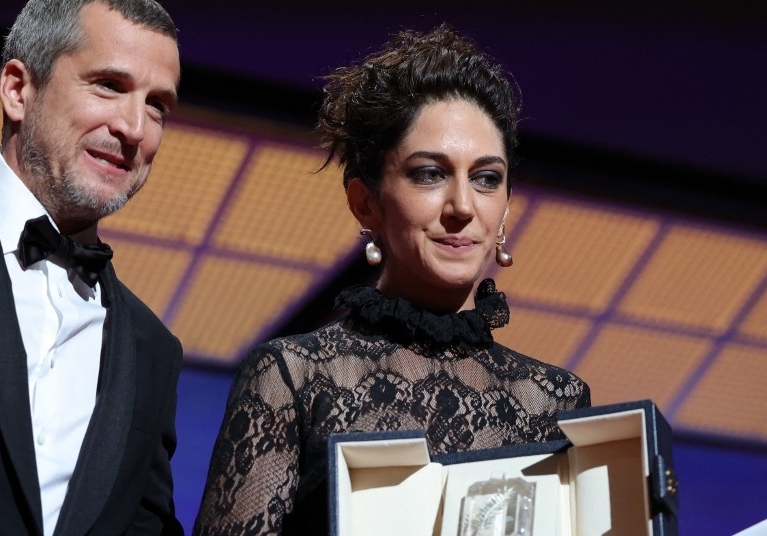
When some of the biggest names in Iranian cinema decided to join the wave of women shedding their mandatory hijab, it posed a dilemma not only for filmmakers, but for the film industry altogether.
The wave of protests that have swept Iran since Mahsa Amini was arrested for not wearing her hijab "appropriately" and later died in police custody in September has led to a momentous movement in Iranian society that has seen women defiantly appearing in public without their headscarves.
Art activists and critics believe that the film industry cannot return to the pre-protests era, and that it will usher in a new face for Iranian cinema.
The uncertainty over the future of the hijab in Iran has even led some directors to film scenes of actors both with and without a headscarf.
Iranian artists have declared their support for the people, attacking the state for its deadly crackdown on protesters, and unprecedentedly joined the protest movement.
This has enraged conservative principlist officials who, in turn, repeatedly called for the “prosecution” of celebrities who “agitated” people to pour into the streets.
Consequently, a large number of famous artists have been summoned to the judiciary or intelligence organisations.
Even stars like Hengameh Ghaziani and Katayoun Riahi, who had removed their scarves publicly, were arrested, and later released on bail.
That, however, did not deter other big names from removing their headscarves, such as Taraneh Alidoosti, known for her key role in The Salesman directed by Oscar-winning Asghar Farhadi.
In the early days of the protests, popular comedian Mehran Modiri released a video, urging the Islamic Republic not to “kill” people. A few days later, he left the country, but his passport was confiscated upon his arrival back in Tehran in October.
Arresting artists
Mahdi Kouhyan, a member of the House of Cinema association, on 4 December said that 40 cinema figures have been arrested so far.
"We have a list of 150 artists who have been summoned, arrested, charged, banned from going abroad, and have faced restrictions in various ways," Kouhyan told local media.
Simultaneously, the Islamic Republic has sought to calm the celebrities to some extent.
According to the hacked secret bulletins of Revolutionary Guard-affiliated Fars News Agency for IRGC chief commander Hossein Salami, an adviser to the general held a meeting with a number of artists, including actor Mohammad-Reza Sharifinia and famous comedian Rambod Javan.
The bulletin said the participants of the meeting were ultimately not convinced that Iranian authorities did not kill Amini. However, Javan later posted a story on his Instagram page, declaring that he had not attended the meeting.
For all that, the pressure on artists has not stopped and some of them, including actor Soheila Golestani, are behind bars.
Early in December, around 400 artists threatened to hold a sit-in in front of the House of Cinema in protest.
"An artist is the expressive voice of the people and the sympathiser of the society, and he/she should not be in prison for fulfilling his/her social mission," the artists wrote in an open letter.
Meanwhile, cinema associations have also raised their voices.
The Iranian Cinema Screen Writers Guild published a statement on 4 December criticising the Islamic Republic for "denying the demands of the people" and announced that its members will avoid any communication with government institutions at any level for the time being
The dilemma
Amid these arrests and and acts of removing headscarves, the Iranian cinema is now facing an unprecedented crisis as questions arise about how the crisis will affect the future of the industry.
A Tehran-based film critic, who prefers to remain anonymous, said he believes the decision by famous actor Taraneh Alidoostri to remove her hijab will lead Iranian authorities to prevent the screening of two major movies she's starring in, Brothers of Leila and Subtraction.
The critic also said the movie Beyond the Wall will likely not be screened either after its acclaimed director Vahid Jalilvand twice released short clips against the Islamic Republic.
"The society of Iran is not the society it used to be three months ago. Many Iranian women are publicly defying the state by coming out without scarves covering their hair," he told Middle East Eye.
"Therefore, Iranian cinema is also facing a great dilemma as it can no longer film scenes where women are covering their hair in the house or sleeping with their headscarves.
“Many big names have supported the protests or have removed their headscarves. Even if the Islamic Republic doesn’t ban their acting, they wouldn’t go back and wear headscarves in movies again as it would symbolise a retreat for them and a slap in the face of protesters.”
The new face
The annual state-run Fajr Film Festival of Iran, which will be held in February, will likely be a turning point for Iranian cinema and a grave challenge for the Islamic Republic as some directors may boycott it.
Additionally, the hijab will be a great issue for actors attending the festival this year, as some prominent artists may try to appear without a headscarf to defy the official dress code.
In what could be a sign for the Iranian state, Golab Adineh, a well-known veteran theatre actor, recently appeared in public without a headscarf on the sidelines of a play she directed.
'[Actors] wouldn’t go back and wear headscarves in movies again as it would symbolise a retreat for them and a slap in the face of protesters'
- Film critic, anonymous
“I don’t think any independent director would participate in this year’s Fajr Film Festival given the current turbulent situation. So, the government will try to persuade the conservative and principlist directors, who are a minority in cinema, to rush to produce and present their movies at the Festival,” the chief editor of a daily in Iran told MEE on condition of anonymity for security reasons.
He added that the same thing has happened with state TV, where amateur principlist directors and cast are filling the void left by independent directors, and this has further decreased the number of its viewers.
It is not clear whether a national reconciliation will take place in Iran. But, if it doesn't, the state may be faced with two choices regarding its film industry: accepting a hijabless cinema or excluding independent directors and actors, and focusing instead on attracting principlist directors and casts.
A former reformist official in the culture ministry told MEE that in the past few years, two movies were banned from screening for featuring actors not wearing the hijab, The Killer and the Savage and Kanape.
If Iranian authorities relent and allow their screening, it may mean that Iranian cinema will be allowed to move much closer to society.
Middle East Eye delivers independent and unrivalled coverage and analysis of the Middle East, North Africa and beyond. To learn more about republishing this content and the associated fees, please fill out this form. More about MEE can be found here.


